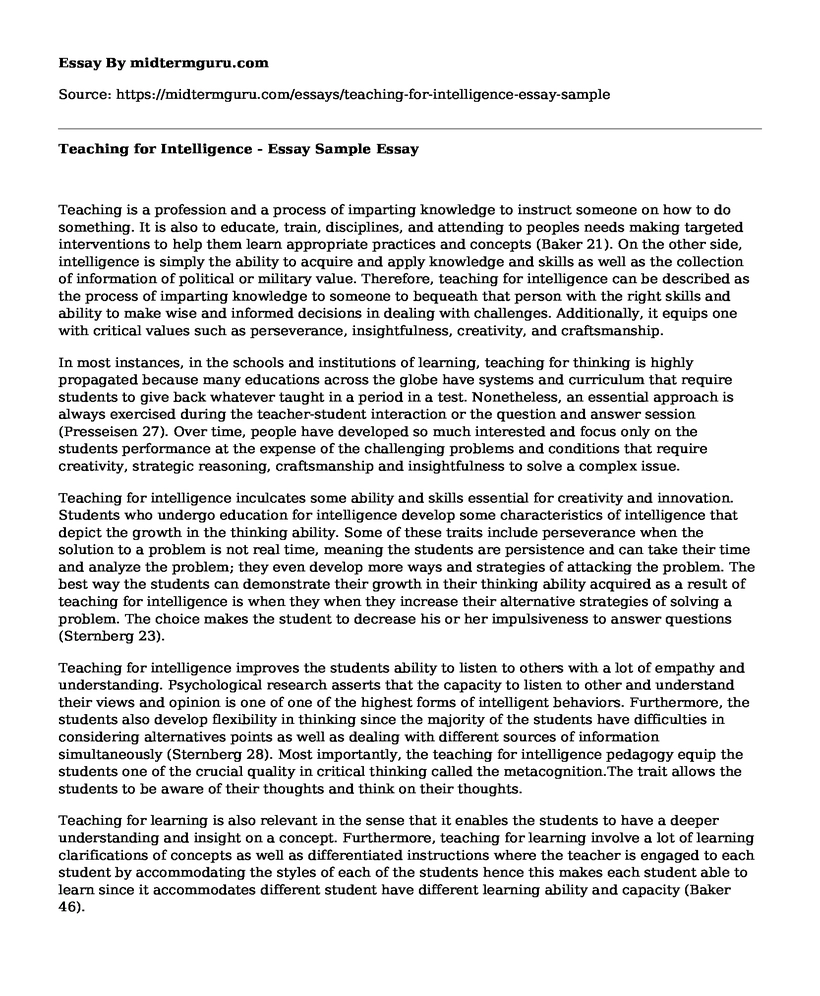Teaching is a profession and a process of imparting knowledge to instruct someone on how to do something. It is also to educate, train, disciplines, and attending to peoples needs making targeted interventions to help them learn appropriate practices and concepts (Baker 21). On the other side, intelligence is simply the ability to acquire and apply knowledge and skills as well as the collection of information of political or military value. Therefore, teaching for intelligence can be described as the process of imparting knowledge to someone to bequeath that person with the right skills and ability to make wise and informed decisions in dealing with challenges. Additionally, it equips one with critical values such as perseverance, insightfulness, creativity, and craftsmanship.
In most instances, in the schools and institutions of learning, teaching for thinking is highly propagated because many educations across the globe have systems and curriculum that require students to give back whatever taught in a period in a test. Nonetheless, an essential approach is always exercised during the teacher-student interaction or the question and answer session (Presseisen 27). Over time, people have developed so much interested and focus only on the students performance at the expense of the challenging problems and conditions that require creativity, strategic reasoning, craftsmanship and insightfulness to solve a complex issue.
Teaching for intelligence inculcates some ability and skills essential for creativity and innovation. Students who undergo education for intelligence develop some characteristics of intelligence that depict the growth in the thinking ability. Some of these traits include perseverance when the solution to a problem is not real time, meaning the students are persistence and can take their time and analyze the problem; they even develop more ways and strategies of attacking the problem. The best way the students can demonstrate their growth in their thinking ability acquired as a result of teaching for intelligence is when they when they increase their alternative strategies of solving a problem. The choice makes the student to decrease his or her impulsiveness to answer questions (Sternberg 23).
Teaching for intelligence improves the students ability to listen to others with a lot of empathy and understanding. Psychological research asserts that the capacity to listen to other and understand their views and opinion is one of one of the highest forms of intelligent behaviors. Furthermore, the students also develop flexibility in thinking since the majority of the students have difficulties in considering alternatives points as well as dealing with different sources of information simultaneously (Sternberg 28). Most importantly, the teaching for intelligence pedagogy equip the students one of the crucial quality in critical thinking called the metacognition.The trait allows the students to be aware of their thoughts and think on their thoughts.
Teaching for learning is also relevant in the sense that it enables the students to have a deeper understanding and insight on a concept. Furthermore, teaching for learning involve a lot of learning clarifications of concepts as well as differentiated instructions where the teacher is engaged to each student by accommodating the styles of each of the students hence this makes each student able to learn since it accommodates different student have different learning ability and capacity (Baker 46).
In conclusion, teaching for learning is imperative since knowledge is power and it equips the students with appropriate skills and knowledge in carrying out professional duties. However, teaching for intelligence is the best strategy since it goes beyond just having the knowledge and remaining in the status quo but motivates and subjects the student to critical thinking. The students not only become critical thinkers buts also develop critical skills and traits necessary for problem solving.
Works cited
Baker, Thomas E. Test Preparation and Instructional Strategies Guide for Intelligence-Led Policing: Leadership, Strategies & Tactics. Flushing, N.Y: Looseleaf Law Publications, Inc, 2009. Print.
Presseisen, Barbara Z. Teaching for Intelligence. Thousand Oaks, CA: Corwin Press, 2008. Print.
Sternberg, Robert J, Elena Grigorenko, and Linda Jarvin. Teaching for Wisdom, Intelligence, Creativity, and Success. New York: Skyhorse Publishing, 2015. Internet resource.
Sternberg, Robert J, and Elena L. Grigorenko. Teaching for Successful Intelligence: To Increase Student Learning and Achievement. , 2007. Internet resource.
Cite this page
Teaching for Intelligence - Essay Sample. (2021, May 26). Retrieved from https://midtermguru.com/essays/teaching-for-intelligence-essay-sample
If you are the original author of this essay and no longer wish to have it published on the midtermguru.com website, please click below to request its removal:
- The U-Shaped Acquisition
- Special Teaching in Higher Education - Paper Example
- Essay on My Experience With Learning the English Language
- Group Discussion and Presentation Reflection Essay
- Paper Example on College Life Dilemma
- Developmental Disabilities: Annotated Bibliography
- Socioeconomic Disparities in Language Acquisition: A Sociolinguistic Study - Research Paper







